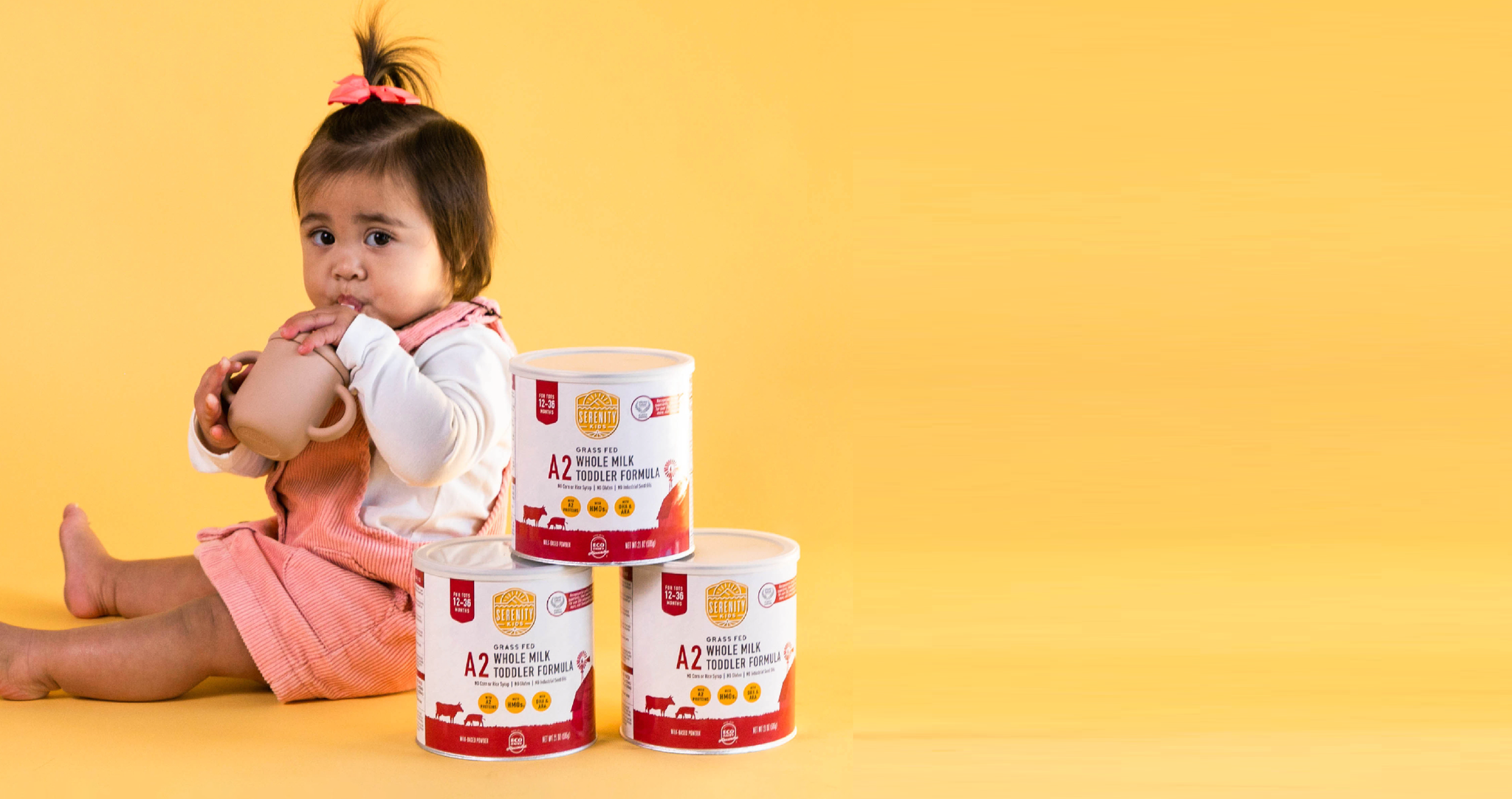TABLE OF CONTENTS
Written by Hillary Bennetts
December 15, 2022
Toddler Formula: Everything Parents Should Know

A common question among parents when their babies are approaching a year is whether they should transition from infant formula or breast milk to whole milk, alternative milk, or toddler formula.
It’s a good question, but like many things, there isn’t a one-size-fits-all answer. Every baby and every family has unique circumstances. And not all milk, alternative milk, and toddler formula is created equal. So we’re sharing the scoop on all the different options so you can make the best decision for your family.
All You Need to Know About Toddler Formula
Toddler formula is a type of powdered or liquid beverage marketed for children between the ages of one to three years old. There are many types of toddler formulas on the market, and they vary significantly in ingredients and quality. Toddler milk formulas start with milk (A1 cows milk and goat milk are the most common) and add other ingredients (inflammatory seed oils and synthetic nutrients are most commonly used). Nutrient composition varies, too. Some best toddler formulas meet infant nutrient guidelines and some don't.
Alternatives to Toddler Formula
There are a number of alternatives to consider when transitioning your little one from breast milk or infant formulas. They fall into two main categories - animal (such as cow or goat) or plant milks (from nuts, seeds, peas, oats, and soy milk).
Animal Milks
Cow’s milk and goat’s milk can be nutritious options but they vary significantly in quality and sourcing. Conventional milk is made from grain-fed cows raised on factory farms and has a lower nutrient density than organic milk that comes from cows raised on regenerative pasture. In addition, cow’s milk can come from cows with A1 protein or A2 protein. A1 milk makes up the vast majority of milk on the market, but can be difficult for some to digest. A2 milk is far less common but has a number of benefits that we discuss in more detail here.
Goat’s milk also varies significantly in quality. It also has a much different flavor profile than cow's milk. While it is tolerated better by some little ones with sensitive digestion, as it contains only A2 protein, its strong earthy taste isn’t loved by all.
Plant Milks
Many parents are also curious about alternative or “plant-based” milks. Like cow’s milk or goat’s milk, alternative milks vary significantly in quality. They often contain a number of fillers like industrial seed oils, gums, and other additives. They also tend to lack key nutrients or contain low-quality synthetic nutrients in an attempt to make the nutrition label look more similar to cow’s milk.
Key things to watch out for in alternative milks include:
-
Industrial seed oils: Oils like sunflower, safflower, or canola cause inflammation and other related health concerns. Read more on why and how here.
-
Gums: Gums like guar gum, gellan gum, locust bean gum, and xanthan gum are often used to prevent separation and to help alternative milks have a texture similar to cow’s milk, but they have questionable effects on health, primarily gut health.
-
Cane sugar: Sugar makes things taste more appealing for little ones, but added sugar isn’t good for your little one’s overall health, or their teeth. Because of this, the American Association for Pediatrics recommends against offering added sugar before age 2, and limiting it after age 2. Whole milk is naturally sweet from lactose, making it taste appealing without added sugar.
-
Poor vitamin forms: Not all vitamins are created equal either. Some forms are better used by the body than others, but oftentimes the cheaper, lower-quality forms are used.
If you start looking at labels, you’ll see that it’s pretty tough to find plant-based alternative milk that doesn’t contain these items. If you do prefer plant-based milk, you can opt to make it at home yourself, using whole ingredients like soaked almonds and water. However, the process can be a bit time consuming and messy. You can also seek out a brand with only simple, clean ingredients, like Three Trees or MALK. The downside with these is that they tend to be a bit cost prohibitive when you need to buy in larger quantities. A good middle ground if you’re willing to do some prep is to find a premixed nut milk base like Joi which you blend with water as needed.
However, it’s important to note that while homemade and “clean” alternative milks are better than store-bought, they still lack key nutrients that your little one needs. So if you go this route, be sure that their diet includes nutrients needed that they might be missing from milk or formula.
Toddler Formula vs Other Options
Most toddler formulas contain ingredients we prefer to avoid, like corn syrup and industrial seed oils. Whole organic grass-fed milk is actually a more nutritious option than a processed beverage containing these ingredients. It is also more nutritious than alternative toddler milks.
However, Serenity Kids’ A2 Whole Milk Formula is a different story. We’re anything but typical! Our Toddler Formula contains whole, organic grass-fed A2 milk alongside only healthy fats and optimal nutrient forms, plus prebiotics and nucleotides. It is free from soy, industrial seed oils, gluten, GMOs, grains, and synthetic folic acid.
Therefore, when comparing Serenity Kids’ A2 Whole Milk Organic Formula to whole milk and other alternative milks, ours comes out on top. Our formula is more nutritious than any other fortified beverage.
How Should You Start Your Child on Toddler Formula?
Ready to make the transition to toddler formula from infant formula, whole milk, or breast milk (or a combination of any of these)? We recommend toddler formula by gradually mixing it with your little one’s current beverage of choice. For example, start with a ratio of ¼ toddler formula to ¾ of their current drink. Then shift to half and half, then to ¾ and ¼. This gradual process helps to slowly introduce different flavors and nutrients to your little one’s palate and digestive system. However, we recognize that not everybody has the flexibility to make a gradual transition. So, don’t sweat it if it isn’t possible!
It’s important to note that Serenity Kids’ A2 Whole Milk Formula is designed to mimic breast milk (of course, we acknowledge it is not the same!), so, unlike infant formula, it can be used to supplement breastfeeding. It is a great, nutritionally-dense option to use as you wean your little one, no matter what that process looks like for you.
Why Might Your Child Need Toddler Formula?
Many parents use toddler formula as a supplement to their little one’s diet and to help transition their child from breastfeeding or infant formula to whole solid foods. Because Serenity Kids A2 Whole Milk Toddler Formula was designed to mimic the nutritional needs and content of breast milk, many parents offer their little ones our toddler formula alongside breast milk.
There are also some health reasons that some parents might opt to include toddler formula in the diets of their little ones. For example, sometimes healthcare providers indicate that a child might benefit from formula to help address certain development or growth concerns or to supplement in the case of certain kidney conditions.
As it contains healthy fat and protein and a number of beneficial vitamins, minerals, prebiotics, and nucleotides, many parents love offering our Toddler Formula as a nutrient boost to their little one’s day. It’s a simple and nutritious addition to a smoothie or other beverage for both healthy toddlers and older kiddos.
Fun ways to use toddler formula
If you want to mix up your little one’s plain formula, try some of our fun recipe ideas:
Conclusion
There are tons of choices out there when it comes to what to feed your little one. But just remember, not all milk or formula is created equal. Quality matters, so read labels and do your research, while always considering what makes most sense for the unique needs of your family. And know that our A2 Whole Milk Formula was created with the optimal health of your little one in mind, using only the highest quality milk, fats, and nutrients. Because every bite (and sip!) counts!
We also recommend reading our other blogs related to Toddler Formulas. Check out these articles - When Do Babies Stop Drinking Formula,
How Long is Formula Good For, and Can You Freeze Formula.
You Might Also Like
· 1 min read · Recipes
· 7 min read · Education















































